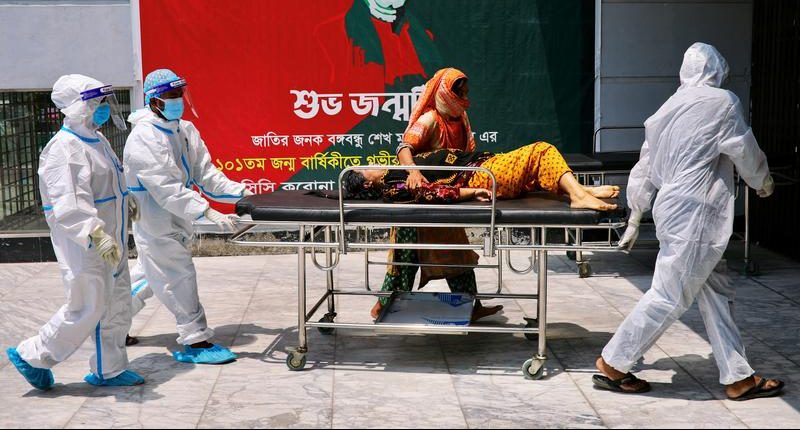Updates & Press
Featured | May 28, 2021
Weekly Humanitarian News Digest – May 28
Author | MedGlobalComms

Each week, we highlight the latest news related to the humanitarian and health crises in our countries of operation: Bangladesh/ Myanmar, Colombia/ Venezuela, Gaza/ Palestinan Territories, India, Lebanon, Pakistan, Sudan, Syria, and Yemen. For more frequent updates, make sure to follow us on Facebook, Instagram, and Twitter.
Cover Image: REUTERS/Mohammad Ponir Hossain
Latest News for May 21 – May 28, 2021
Bangladesh/ Myanmar
Bangladesh has imposed lockdowns in five camps after a rapid increase in COVID-19 cases among Rohingya refugees. On May 20, the positive test rate in the crowded camps was above 18%. In total, officials have reported 864 cases and 13 deaths among the Rohingya refugees. Bangladesh’s vaccination campaign has also stalled after India halted vaccine exports, leading to an indefinite delay in vaccinations for refugees. (Reuters)
Colombia/ Venezuela
Colombia is asking the United States for COVID-19 vaccines to help accelerate its vaccination campaign. The request comes after the U.S. announced its plan to donate 80 million doses to poor and developing countries. In Colombia, eight million people have been vaccinated and the government says it has purchased enough doses for 35 million people. More than 8,000 critically-ill patients are currently receiving treatment for COVID-19 and intensive care units across the country are at full capacity. Since the beginning of the pandemic, Colombia has recorded 3,270,614 cases of COVID-19 and 85,666 deaths. (The City Paper Bogota)
Gaza/ Palestinian Territories
UN agencies are calling for a surge in medical aid to Gaza following the ceasefire. According to the World Health Organization (WHO), 8,538 people were injured and 257 died in Gaza during the conflict. Damage to 30 health facilities, including two hospitals that are fully incapacitated, and roads have drastically reduced access to health services. COVID-19 testing has stopped after the main laboratory was damaged and the WHO has warned that there may be a massive outbreak of new infections. There are also concerns of unexploded bombs that may cause further injuries and deaths in the coming days. (Reuters)
India
India has reported more than 300,000 deaths from COVID-19 and nearly 27 million cases since the pandemic began. The most recent wave of infections overwhelmed the health systems of major cities and many residents died at home or in overcrowded hospitals amid dire oxygen shortages. The virus is now spreading rapidly throughout rural areas where the majority of the population lives with limited access to health services. India has inoculated only 3.8% of its population and the national vaccination campaign has slowed due to shortages of vaccines. (Associated Press)
Lebanon
Lebanon’s central bank announced that it will not release funds to continue subsidizing medicines. The bank cited concerns over having to use its mandatory reserves, which have been depleted by half since the financial crisis began in 2019. Lebanon’s health minister, Hamad Hasan, said that 50% of required medicines are currently sitting in warehouses as importers wait for payment. Money for subsidies—including for fuel, wheat, medicine, and other basic goods—is expected to run out in May. (Al Jazeera)
Pakistan
On Monday, Pakistan reported only 57 deaths from COVID-19, one of its lowest daily death tolls in recent months. Pakistan’s top health official says that the addition of thousands of hospital beds and increased production of oxygen has allowed the country to manage its third wave of infections so far. The highly infectious Indian variant of COVID-19 has also not yet been detected within the country. Pakistan has vaccinated more than five million people and hopes to reach one third of its population by the end of the year. Officials have reported more than 900,000 cases and 20,000 deaths since the pandemic began. (Associated Press)
Sudan
As of May 25, around 70,319 Ethiopian refugees have entered Sudan after fleeing the ongoing conflict in Ethiopia’s Tigray region. The protracted displacement has led to concerns over refugee safety due to the spread of COVID-19, violence along the border, and expected flooding during the upcoming rainy season. According to the UN Population Fund (UNFPA), an estimated 1,594 female refugees are currently pregnant and in need of sexual and reproductive health services. In the coming month, UNFPA expects more than 1,000 adults with STIs and 352 survivors of sexual violence to seek medical care. (ReliefWeb)
Syria
The UN Security Council will soon vote on whether or not to extend the use of a border crossing for humanitarian aid between Turkey and northwest Syria. The Syrian government has repeatedly prevented assistance and aid workers from reaching opposition-held areas, leading to the creation of humanitarian border crossings to provide aid directly to northern Syria. Of the four crossing points that were originally established in 2014, three have already closed and the remaining one will expire on July 10. The closing of the UN border crossing may reduce aid to northwest Syria by half. (The New Humanitarian)
Yemen
The World Food Program (WFP) is ramping up food aid to Yemen, but has warned that the underlying conflict, economic crisis, and COVID-19 continue to threaten long-term food security. The WFP resumed monthly food distributions to 350,000 people in February and scaled up assistance to six million people in April and May after receiving new funding. Food prices in Yemen are 200% above pre-conflict costs and 13 million Yemenis depend on the WFP for emergency food assistance. Nearly 50,000 people are living in famine-like conditions and five million people are on the brink of famine. (UN News)


